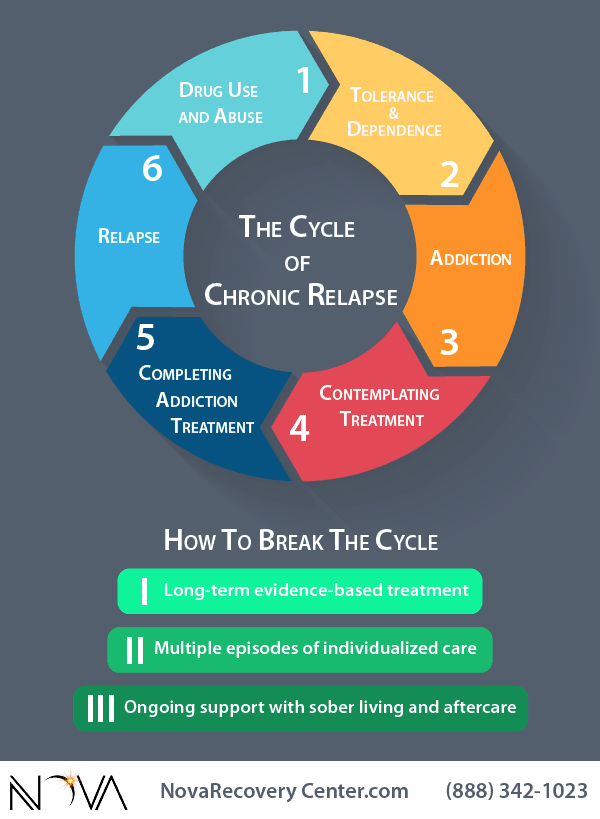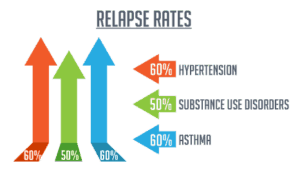Last Updated on August 24, 2023
Let’s pretend for a moment that you’re an alcoholic. Your wife left you and took the kids with her, your family members don’t really talk to you or associate with you anymore, and your only friends are the bottles of liquor that you keep in your kitchen cabinets.

One day you decided you were tired of being depressed and living a life that you hated so you picked up the phone and enrolled in an alcohol detox program.
You completed your detox and spent 30 days in drug rehab before returning to your home. You made it for about six weeks before you cracked and gave in to your cravings for a drink. You convinced yourself it was just a lapse and that it wouldn’t happen again, but the next day, you found yourself at the liquor store replenishing the supply of alcohol that you had emptied from your cabinets several weeks ago.
After six months of heavy drinking and overwhelming shame, you decide to pick yourself up and get back into treatment so you can get sober again—for good this time.
This cycle continues for five years, and before you know it, you’ve completed three different rehab programs and you’ve pledged yourself to a life of sobriety countless times. But it never seems to last.
You’re currently sober and you know the lingo and the tools you learned in rehab like the back of your hand. But despite everything, you still feel the magnetic pull of those liquor bottles in your cabinet and you have a lingering feeling that you’ll be seeing them again soon, regardless of how much you don’t want to.
This continuous cycle is known as chronic relapse and it’s much more common than you might think.
Why Do Some People Struggle with Chronic Relapse?

Chronic relapse typically occurs for a variety of reasons, depending on the individual’s circumstances and life experiences. According to Psych Central, there are a number of factors that may be contributors to chronic relapse.1 They typically include:
- Unresolved trauma
- Family conflict
- Major life transitions
- “Transferred” addictions (overeating, shopping, gambling, sex/love, etc.)
- Dishonesty with treatment counselors and peers in drug and alcohol rehab
- Harmful living environment
[sc name=”phoneinsurancecta”]
Signs and Symptoms of Chronic Relapse
There are several telltale signs of chronic relapse, and although every person is different, individuals struggling with chronic relapse often have the following things in common.2
- They have not firmly decided that they want to live a life of sobriety and still have a desire to experience their drug use.
- They have a wealth of knowledge about addiction, recovery, and sobriety, but they are unable to apply it to their own lives, and therefore, are never able to maintain their sobriety.
- They associate sobriety with a constant struggle and feel hopeless as a result.
- They are only completing drug and alcohol rehab programs to make a loved one happy.
- They have had multiple episodes of treatment but usually leave early, get kicked out, or fake their way through it simply to appease a loved one.
- They refuse to face certain issues related to their addiction or lie to counselors.
How to Avoid Relapse: The Impact of Drug and Alcohol Rehab
Breaking the cycle of chronic relapse is not always easy but it can be achieved with the right type and duration of addiction treatment.
Long-Term Drug and Alcohol Rehab
According to a study published by the journal Addiction Science and Clinical Practice, of all the people admitted to public addiction treatment programs in 2003, 64 percent were reentering treatment, 23 percent for the second time, 22 percent for the third or fourth time, and 19 percent for the fifth or more time.3
Although one month in drug and alcohol rehab may keep some people from ever touching drugs or alcohol again, many people need three to four episodes of treatment over a number of years before they can completely overcome their addiction.
Research shows that the best treatment outcomes are a result of longer periods of time spent in treatment.4 Long-term drug and alcohol rehab programs that last 90 days or longer give clients more time to work through the deep-seated issues that have contributed to their addiction and develop healthier ways to cope with stress and triggers.
Long-term drug and alcohol rehab also provides opportunities to establish a peer support network and get involved in a 12-step group. This network of individuals will be crucial to maintaining long-term sobriety.
Looking for treatment for you or a loved one?
Nova Recovery Center can help prevent chronic relapse!
Call (512) 605-2955 today to learn about our outpatient and inpatient options.
Chronic Relapse Prevention Plan
Every person who completes a drug and alcohol rehab program should also have a (chronic) relapse prevention plan. This is simply a written plan that outlines what he or she will do in the event of a lapse.
There are five key components that should be included in any relapse prevention plan. They are:
- Self-assessment and reflection on previous substance use and triggers.
- A list of triggers and specific plans to deal with each of them should they arise.
- A step-by-step plan of action outlining exactly what the client will do if he or she relapses.
- A list of family members, friends, sponsors, and/or counselors that the client can call if he or she feels like a relapse is imminent.
- Goals for a healthy and sober lifestyle.
A relapse prevention plan should be revised often to reflect the client’s current state of mind, address new triggers, and include any new sobriety goals.
Continuum of Care
Continued treatment after drug and alcohol rehab is essential to fighting chronic relapse. The treatment process will look different for every person, but many individuals in recovery choose to continue their treatment plan by enrolling in a sober living program. Transitional homes provide a structured lifestyle, regular drug and alcohol testing, and peer support for individuals who are learning to live a life of sobriety on their own.
People in recovery may also choose to continue treatment by enrolling in an outpatient program, to reinforce the many skills and tools they learned in rehab. IOP can also enhance the benefits of a sober living program.
Continued involvement in self-help groups such as Alcoholics Anonymous or Narcotics Anonymous is also essential to maintaining sobriety and avoiding relapse. Studies show that peer support is a key component to a sustainable life in recovery.5
If you or a loved one is struggling with chronic relapse, Nova Recovery Center can help. We specialize in helping those who are wrestling with the negative effects of chronic relapse and can provide an effective long-term drug and alcohol rehab program that will combat those issues with relapse prevention plans, peer support, and an affordable and customizable continuum of care plan.
Contact Nova Recovery Center today to speak with an admissions specialist about our gender-specific addiction treatment programs for men and women in recovery.
References:
- https://blogs.psychcentral.com/sex/2011/11/chronic-relapse-unresolved-sex-and-love-addiction-may-be-a-contributor/
- https://www.addictionpro.com/article/help-chronic-relapser
- https://www.ncbi.nlm.nih.gov/pmc/articles/PMC2797101/
- https://www.drugabuse.gov/publications/principles-drug-addiction-treatment-research-based-guide-third-edition/principles-effective-treatment
- https://www.ncbi.nlm.nih.gov/pmc/articles/PMC5047716/


